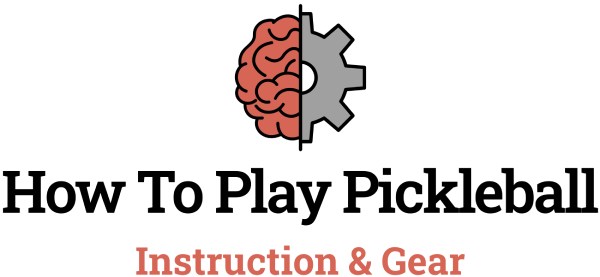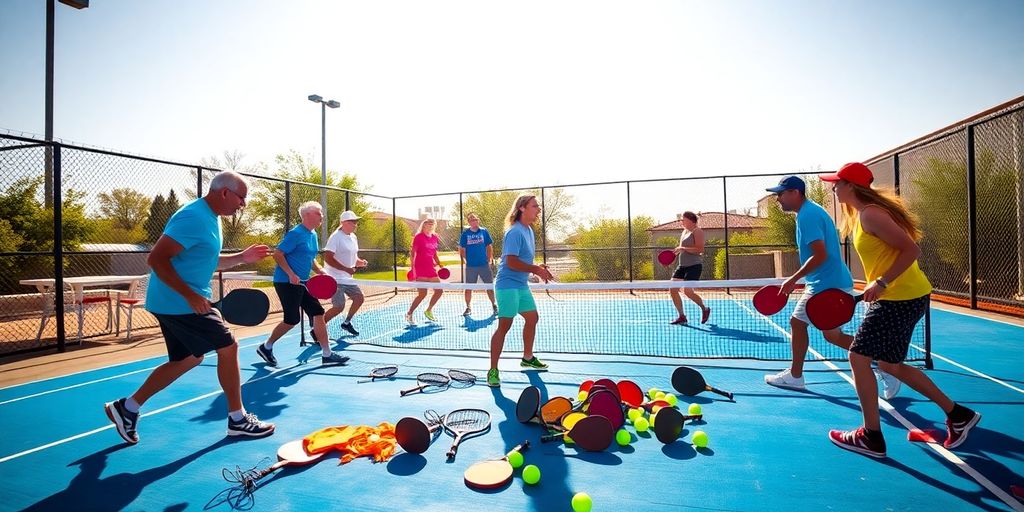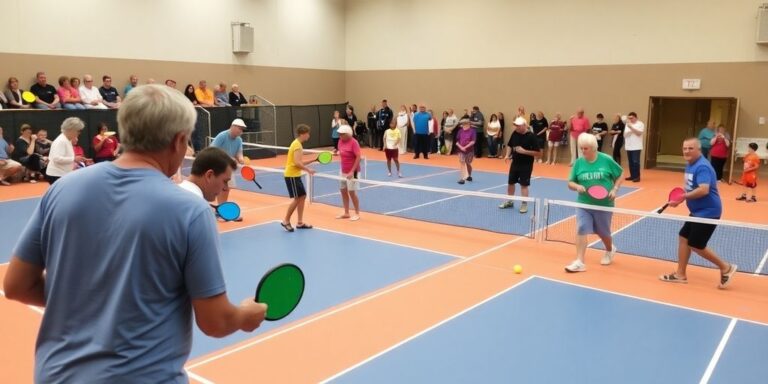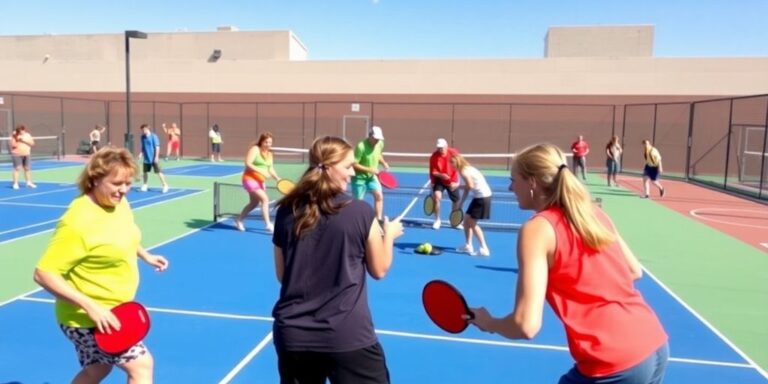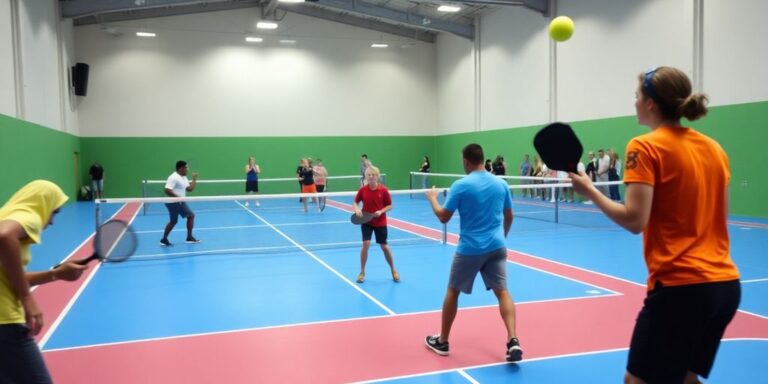Hey there, pickleball fans! If you love the thrill of the game, you probably know that it comes with its own quirky language. From funny terms to serious lingo, pickleball slang adds a unique flavor to the sport. In this article, we’ll break down some of the most entertaining and essential phrases you need to know to fit right in on the court. So grab your paddle and let’s get started!
Key Takeaways
- Pickleball slang is a mix of fun and practical terms that enhance the game experience.
- Knowing the lingo helps players communicate better and strategize effectively.
- Humorous terms like ‘Dillball’ and ‘Falafel’ lighten the mood during intense matches.
- Player nicknames often reflect styles and personalities, adding to the community vibe.
- Understanding the slang can make you feel more connected to the pickleball culture.
Diving Into Pickleball Slang

Okay, so you’re getting into pickleball? Awesome! It’s super fun, but like any sport, it has its own language. It’s not just about knowing what a backhand is; it’s about understanding the funny, quirky stuff people say on the court. Let’s get into some of the slang you’ll hear.
Funny Pickleball Slang Terms
Pickleball is more than just a game; it’s a whole vibe, and the slang is part of that. These aren’t official terms, but you’ll definitely hear them if you hang around the courts long enough. They add a bit of humor to the game. Here are a few:
- Dillball: This is when you miss an easy shot. Like, really easy. It’s the kind of shot you should have made in your sleep.
- Slammers: These are the players who just WHACK the ball every single time. Strategy? What’s that?
- Volley Llama: Someone who lives at the net and tries to volley everything. They’re basically allergic to letting the ball bounce.
- Pickledome: The area you want to avoid, also known as No Man’s Land.
- Falafel: A soft serve that gets devoured by an aggressive opponent.
Learning the slang is like getting a secret decoder ring for the pickleball world. It helps you connect with other players and understand the inside jokes.
Common Phrases You May Hear on the Court
Whether you’re a newbie or a seasoned pro, there are some phrases you’re bound to hear over and over. Knowing these will help you understand what’s going on and maybe even sound like you know what you’re doing. Here’s a quick rundown:
- "Ace!" – When you serve the ball and the other person can’t even touch it. Boom, point for you!
- "Nice setup!" – A compliment for a good shot that sets up your partner for an easy put-away.
- "Bounce it!" – A reminder to let the ball bounce, especially near the non-volley zone.
- "Banger" – Describes a player who prefers power over finesse, typically hitting every shot with maximum force.
- "Kitchen" – Refers to the non-volley zone.
Unique Expressions in Pickleball
Beyond the basics, there are some more unique expressions that you might not hear as often, but they’re still part of the pickleball culture. These add flavor to the game and show a deeper understanding of the sport. Here are a few examples:
- Flapjack: A perfectly flat shot that glides over the net like a pancake on a griddle.
- Pickler: An avid pickleball player who simply can’t get enough of the game.
- Golden Pickle: The term for achieving the rare feat of winning a game without letting opponents score any points.
- Junior: This term refers to young or relatively new players in the world of pickleball who are learning and refining their game play.
- Dinker: Dinkers excel at a specific shot called a ‘dink,’ a soft shot that is designed to just clear the net and drop into the non-volley zone or kitchen.
Understanding Pickleball Lingo
Pickleball, like any sport, has its own language. Getting familiar with this lingo is important, not just for understanding the game but also for communicating effectively with other players. It might seem like a lot at first, but you’ll pick it up quickly as you play more.
Essential Terms for New Players
Starting out in pickleball can feel like learning a new language. There are a bunch of terms that might sound strange at first, but they’re actually pretty simple once you get the hang of them. Knowing these basic terms will help you understand the rules and strategies of the game.
Here are a few to get you started:
- Dink: A soft shot, usually hit near the net, that arcs downward and lands in the non-volley zone.
- Volley: Hitting the ball in the air before it bounces.
- Non-Volley Zone (Kitchen): The area within 7 feet of the net where you can’t volley the ball.
- Fault: A rule violation that stops play.
Learning the lingo is like getting a secret decoder ring for the game. It helps you understand what’s going on and makes it easier to talk strategy with your teammates.
Communication on the Court
Communication is key in pickleball, especially in doubles. Using the right lingo can help you and your partner coordinate your movements and strategies. It’s all about being clear and concise so you can react quickly.
Here are some common phrases you might hear:
- "Yours!" – Letting your partner know you’re taking the shot.
- "Bouncing!" – Warning your partner that the ball is about to bounce.
- "Switch!" – Indicating you want to change positions.
Effective communication can be the difference between winning and losing a point. Make sure you and your partner are on the same page. Check out this pickleball terminology guide for more information.
The Importance of Lingo in Strategy
Understanding pickleball lingo isn’t just about knowing the words; it’s about understanding the strategy behind them. For example, knowing what a "dink" is and when to use it can completely change your game. Similarly, understanding the essential rules around the non-volley zone can help you plan your attacks and defenses more effectively.
Consider these points:
- Using specific terms helps you quickly convey your intentions to your partner.
- Understanding the nuances of different shots (like a "drop shot" vs. a "drive") allows you to make better decisions on the court.
- Familiarity with scoring terms helps you keep track of the game and adjust your strategy accordingly. This glossary of pickleball terms can help you learn more.
Exploring Humorous Pickleball Terms
Lighthearted Slang for Fun
Pickleball is more than just a sport; it’s a community with its own language. Some of the slang is just plain funny. These terms add a layer of fun to the game, making it more enjoyable for everyone involved. It’s not about being serious all the time; it’s about having a good laugh while you’re playing. Knowing these terms can definitely make you the life of the pickleball court.
- "Dillball": An easy shot that should have been made but was missed.
- "Slammers": Players who hit the ball with full force every time, regardless of strategic value.
- "Volley Llama": A player who loves to volley and tries to do so at every opportunity.
It’s amazing how a simple game can create such a unique culture. The slang terms are a big part of that, adding a sense of camaraderie and inside jokes that only pickleball players truly understand.
Creative Names for Shots
Pickleball players have come up with some pretty creative names for different types of shots. These names often describe the way the ball moves or the effect the shot has on the opponent. Using these terms can make communication on the court more efficient and, let’s be honest, more entertaining. For example, a "falafel" is a soft serve that gets devoured by an aggressive opponent. And who can forget the "Flapjack"? A perfectly flat shot that glides over the net like a pancake on a griddle. It’s all about adding a little flair to the game. Understanding pickleball lingo is key.
Playful Nicknames for Players
Just like any sport, pickleball has its share of playful nicknames for players. These nicknames can be based on a player’s style, personality, or even a funny incident that happened on the court. It’s all in good fun and helps to build a sense of community among players. Here are some examples:
- "The Kitchen King/Queen": Someone who dominates the non-volley zone.
- "The Dink Master": A player who excels at dinking the ball.
- "The Lobber": A player who frequently uses lobs. Some might even call them a "lobster" in pickleball.
The Role of Slang in Pickleball Culture

Building Community Through Language
Pickleball slang isn’t just random words; it’s a way for players to connect and feel like they’re part of something bigger. Using the same terms, even silly ones, creates a shared experience. It’s like an inside joke that everyone’s in on. This shared language helps to build camaraderie and makes the game more welcoming, especially for new players. It’s a way to signal, "Hey, we’re all in this together!" and makes the whole experience more fun. You can even find glossary of pickleball terms online.
How Slang Enhances Gameplay
Slang can actually make gameplay smoother and more efficient. Instead of saying, "Hit a soft shot that barely clears the net and lands in the non-volley zone," you can just say "dink it!" It’s quicker, easier, and everyone knows what you mean. This kind of shorthand is super useful during fast-paced rallies when you don’t have time for long explanations. Plus, using slang can add a bit of levity to the game, which can help to ease tension and keep things light, even during competitive matches. It’s all about clear and quick communication.
The Evolution of Pickleball Terms
Pickleball slang is constantly evolving. New terms pop up all the time, and old ones can fade away. This evolution reflects the changing nature of the game itself, as well as the creativity and humor of the players. It’s interesting to see how certain terms catch on and become widely used, while others remain niche or regional. The evolution of slang also shows how the culture of pickleball is growing and changing, as new players bring their own influences and ideas to the game. It’s a living, breathing language that reflects the community’s spirit. Understanding pickleball etiquette is also important.
Slang in pickleball isn’t just about funny words; it’s about building connections, streamlining communication, and reflecting the ever-changing culture of the game. It’s a vital part of what makes pickleball so unique and enjoyable for so many people.
Common Pickleball Terms You Should Know
Basic Gameplay Terminology
Okay, so you’re stepping onto the court. First things first, you gotta know the basics. Understanding these terms is like learning a new language, but way more fun.
- Serve: The underhand shot that starts each point.
- Dink: A soft shot, landing in the non-volley zone (kitchen).
- Volley: Hitting the ball in the air before it bounces.
- Fault: A rule violation that stops play.
It’s easy to get overwhelmed at first, but don’t sweat it. Everyone starts somewhere. Just focus on getting the basics down, and you’ll be volleying like a pro in no time. Remember to practice your backhand and your dinks!
Equipment and Court Terms
Knowing your paddle from the kitchen is key. Here’s a quick rundown:
- Paddle: What you use to hit the ball (duh!).
- Net: The thing you try to avoid hitting the ball into.
- Baseline: The line at the back of the court.
- Sideline: The lines on the sides of the court.
- Kitchen (Non-Volley Zone): The area close to the net where you can’t volley.
Scoring and Rules Language
Pickleball scoring can seem weird at first, but it’s not too bad once you get the hang of it. Here’s the deal:
- Points are only scored by the serving team.
- Games are usually played to 11 points, win by 2.
- The serving team announces the score before each serve (Server Score – Receiver Score – Server Number).
| Term | Definition
Pickleball Player Nicknames
Identifying Playing Styles
Pickleball, like any sport, has its share of colorful characters, and with those characters come nicknames that often reflect their playing style. Some nicknames are earned through skill, others through quirks, but they all add to the fun of the game. These nicknames help quickly identify a player’s strengths or tendencies on the court.
- The Dink Master: This player is known for their exceptional dinking skills, patiently placing the ball just over the net.
- The Banger: This player loves to smash the ball as hard as possible, often sacrificing finesse for power.
- The Kitchen Commander: This player dominates the non-volley zone, controlling the pace and flow of the game near the net.
It’s interesting how nicknames can evolve organically within a pickleball group. Sometimes it’s a one-off comment that sticks, other times it’s a consistent trait that earns a player their moniker. Either way, these nicknames become a part of the local pickleball culture.
Fun Titles for Different Players
Beyond playing styles, nicknames can also be based on personality, quirks, or even just funny incidents that happen on the court. These titles add a layer of humor and camaraderie to the game. Finding team names can be a fun activity for your group.
- The Chatterbox: This player never stops talking, offering encouragement, advice, or just general commentary.
- The Lucky One: This player seems to always get the lucky bounces and net cords.
- The Strategist: This player is always thinking several moves ahead, analyzing their opponents’ weaknesses.
Cultural References in Nicknames
Sometimes, pickleball nicknames draw from pop culture, history, or other shared experiences. These references can make the nicknames even more memorable and meaningful. Understanding basic gameplay is important, but having fun is too!
- The Viking: A player known for their aggressive, all-out style of play.
- The Ninja: A player with incredibly quick reflexes and stealthy movements on the court.
- The Professor: A player who is always analyzing the game and offering advice to others. It’s important to know the 2-player pickleball rules before you start giving advice, though!
The Impact of Slang on Gameplay
Facilitating Team Communication
Pickleball slang isn’t just for laughs; it’s a surprisingly effective way to communicate quickly and efficiently on the court. Think about it: shouting "kitchen!" is way faster than explaining that someone stepped into the non-volley zone. This shorthand allows teammates to react faster and adjust their strategy on the fly. It’s like having a secret code that only pickleball players understand. This is especially useful in fast-paced doubles matches where split-second decisions are the norm. Using terms like "dink shot" or "lob" helps teammates coordinate strategies without revealing plans to opponents.
Enhancing Game Enjoyment
Slang adds a layer of fun and camaraderie to the game. It lightens the mood, especially during intense matches. Imagine nailing a tricky shot and yelling "Opa!" It’s infectious! It creates a more relaxed and enjoyable atmosphere for everyone involved. Plus, learning and using the slang makes you feel like you’re truly part of the pickleball community. It’s a way to connect with other players and share a common language.
Here are a few ways slang enhances the fun:
- Breaks the ice with new players.
- Adds humor to friendly matches.
- Creates memorable moments on the court.
Creating a Unique Game Atmosphere
Pickleball slang contributes to the unique culture of the sport. It sets it apart from other racquet sports and gives it a distinct identity. The slang is constantly evolving, with new terms and phrases popping up all the time. This keeps the game fresh and exciting. It’s a living language that reflects the creativity and personality of the pickleball community. The use of slang helps build community through language, making the sport more inviting and engaging for players of all levels.
Pickleball slang is more than just a collection of funny words. It’s a tool for communication, a source of enjoyment, and a key element of the sport’s unique culture. It helps players connect, strategize, and have a good time on the court. So, embrace the slang, learn the lingo, and get ready to experience pickleball in a whole new way.
Slang can really change how we play games. It helps players connect and share ideas quickly, making the experience more fun. But sometimes, it can confuse new players who don’t know the terms. If you want to learn more about how slang affects gaming, check out our website for tips and tricks!
Wrapping It Up
So there you have it! Knowing the slang and terms of pickleball can really change how you play and enjoy the game. With this guide, you’re ready to hit the court and chat it up with other players like a pro. Don’t be shy—use those fun phrases and get in on the action. Whether you’re smashing a ‘dillball’ or avoiding the ‘pickledome,’ just remember to have fun and enjoy every moment on the court. Now grab your paddle and get ready for some great matches!
Frequently Asked Questions
What are some funny terms used in pickleball?
In pickleball, you might hear terms like ‘Dillball’ for an easy shot that was missed, or ‘Falafel’ for a soft serve that gets hit hard by an opponent.
How does scoring work in pickleball?
In pickleball, you score points when you serve. The goal is to reach 11, 15, or 21 points before your opponents do.
What does ‘Dead Ball’ mean?
A ‘Dead Ball’ is one that can’t be played because of a rule violation, like hitting it out of bounds.
Can you explain what a ‘Dink’ is?
A ‘Dink’ is a soft shot that just goes over the net and lands in the non-volley zone, also called the kitchen.
What are some common phrases used during games?
Common phrases you’ll hear include ‘Nice shot!’ when someone makes a good play or ‘Watch the kitchen!’ to warn someone about stepping into the non-volley zone.
Why is slang important in pickleball?
Using slang helps players communicate better on the court, making the game more fun and improving teamwork.
